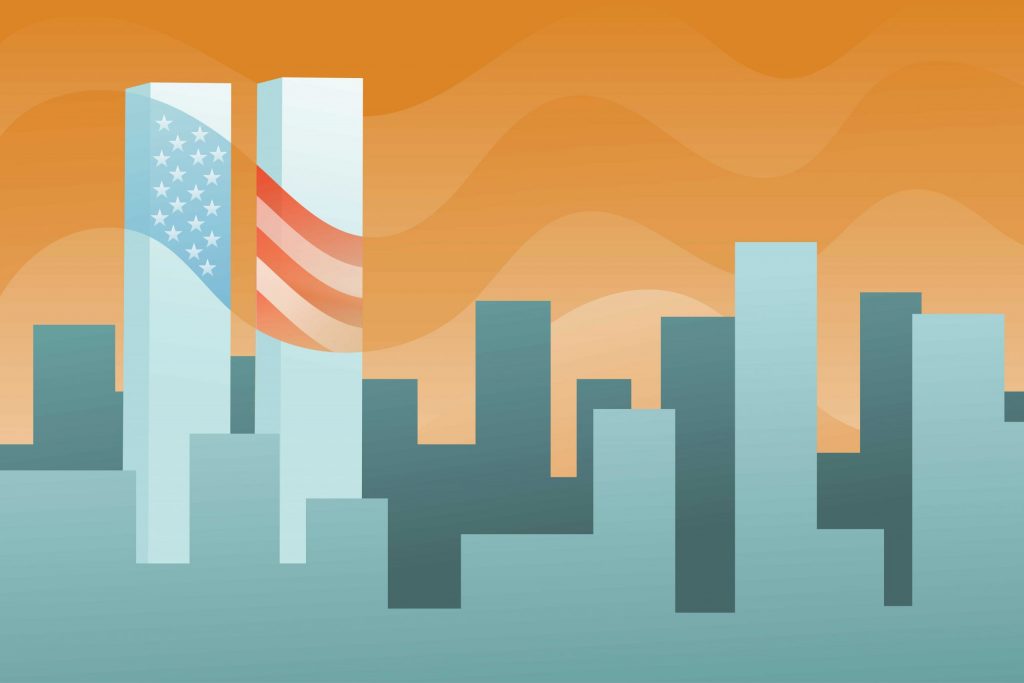SU community reflects on 20th anniversary of 9/11 terror attacks, looks towards future
SU community reflects on 20th anniversary of 9/11

With the 20th anniversary of the September 11th terrorist attacks on Saturday, students and faculty are taking time to reflect on their own experiences with the tragedy that took place two decades ago as well as its aftermath.
Early that morning, before the North tower was struck by a plane at 8:46 am EST, it was just any other day, across the county and on Syracuse University’s campus. Terrell Northrup, associate teaching professor of international relations and political science, was in a faculty meeting here at Syracuse when the attack began.
“I remember it like it was yesterday. It was an amazing and amazingly horrible thing,” Northup said. “Somebody came in, walked into the office, and said ‘An airplane just crashed in New York City.’”
In addition to teaching international relations, Northrup was in charge of a cohort of freshmen students through a course known as the freshmen forum. She recalls counseling students through a period of uncertainty, particularly those personally affected by the tragedy.
“A lot of students at SU come from New York City, so I had students, even a couple whose parents worked in the city,” Northup said. “I got stories for the next couple of weeks about what happened to their families and where their families were at the time.”
September 11th was also a topic of conversation in the classroom, particularly for international relations students. Northrup said she has “talked about citizens of countries and what things they worry about, and the transition over the years.” She added that after September 11th, “terrorism became obviously the thing that people worried about, and now it’s much more [about] climate change and the pandemic.”
Samuel Gorovitz, philosophy professor and former Dean of the College of Arts and Sciences at Syracuse University, recalls he was presenting a lecture to a group of female students at Upstate Medical University when the Twin Towers were attacked. He recalls a sense of uncertainty and fear for the following days and weeks on campus.
“The feeling on campus was, I think, reflective of the feeling generally,” Gorovitz said. “Some people understood that the first casualty in the aftermath of a major event of this kind, the first casualty is truth. There was a lot of confusion about what to believe. There were certainly currents of anger, of grief, of fear. A sense that if that could happen, we didn’t know what else could happen.”
Most undergraduate students on campus were infants or toddlers during the September 11th attacks, if they were even alive. Reflecting on that momentous day that has evolved as 9/11 falls further back in the nation’s history. The Rev. Brian Konkol, dean of Hendricks Chapel, is helping to facilitate this year’s memorial service at Hendricks at 8:46 a.m. Saturday
“Our September 11th programming will be centered on two themes. The first is remembrance. The second is resilience. Recognizing that 20 years ago, there was a significant amount of tragedy, hardship, and struggle, and we will remember those lives that were lost. And we will also remember the resilience that came out of that day and the 20 years since,” Konkol said.
In the fall of 2001, Konkol had just begun his first semester of Seminary. He remembers coming back from a run to find everyone in his apartment building frenzied. A few hours later, he was gathered in the seminary chapel listening to the announcement that there had been an attack on the twin towers.
“I remember exactly where I was. I remember exactly what I was feeling, and I do think that by having an intentional time to pause and reflect on those experiences, it helps us to learn from those experiences,” Konkol said.
“Being here now in New York and recognizing the significance of September 11th, not just for the City of New York, but also for New York state and for this region,” Konkol said. “It does feel different.”
This anniversary is unique not only because it marks two decades since the September 11th terror attacks, but because it comes just days after President Biden withdrew all troops from Afghanistan. The growing instability in Afghanistan colors America’s post-9/11 legacy, particularly when it comes to foreign policy in the Middle East, Northup said.
“It’s very upsetting to me to see what’s happening with Afghanistan,” Northup said. “I’m not very happy about how we pulled out. It was going to have to happen at some point, I mean, in a way there are some similarities to Vietnam in that we got into something that we couldn’t win” said Northrup.
Gorovitz too reflected on the Afghanistan War and the recent American withdrawal from the country.
“We would not have been involved in the war in Afghanistan but for the 9/11 events. Our involvement in Afghanistan was mishandled from the outset all the way through” said Gorovitz.
Though the anniversary can conjure up frustration or regret, it can also present an opportunity to examine the future of the United States. While Gorovitz expressed disappointment towards how the withdrawal from Afghanistan was handled, he expressed staunch support of welcoming Afghan refugees into the United States.
“I feel completely committed to the view that we should welcome and embrace and support all of those who are refugees from Afghanistan,” Gorovitz said.





